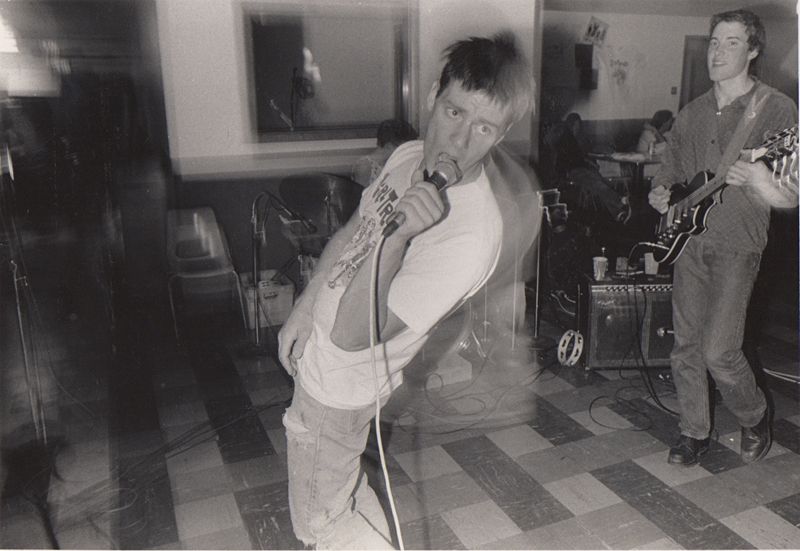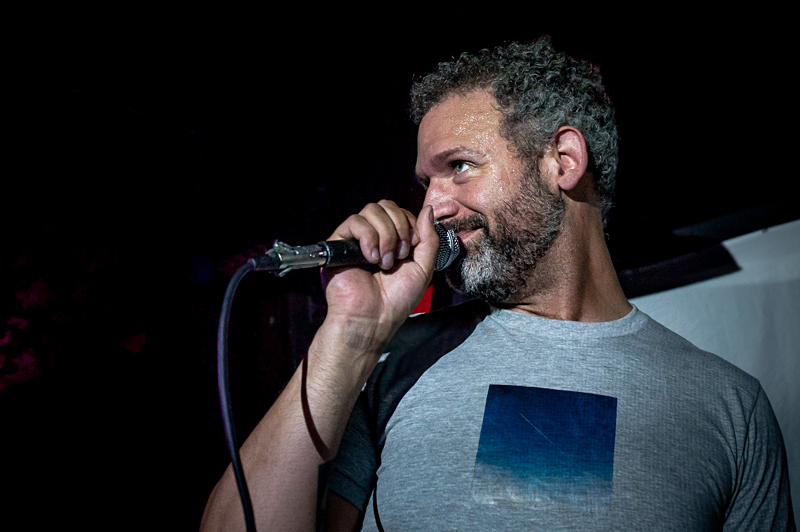Editor’s Note: Mark Baumgarten, a longtime music journalist who’s held spots on the mastheads of Willamette Week and Sound Magazine and is currently editor-at-large at City Arts, published his first book this week, a biography titled Love Rock Revolution: K Records and the Rise of Independent Music, (Sasquatch, $17.95). To get the goods on Baumgarten’s tome—and his experience with the label’s famously difficult founder, Calvin Johnson—we dispatched Charles R. Cross. Like Baumgarten, Cross is a music journalist (for a time he owned and edited The Rocket, which shut down in 2000) and biographer who has chronicled artists from Kurt Cobain to Led Zeppelin. Here’s what transpired:
Charles R. Cross: Your book is subtitled “K Records and the Rise of Independent Music,” but it’s also the story of Calvin Johnson. How do you separate the two?
Mark Baumgarten: I want people to know this isn’t a biography of Calvin Johnson, even if for the first 100 pages or more it reads like one. If I were writing a biography of Calvin, it would be much different.
How?
I would have gone more into his personal life. I talk about his early life and his family, but I don’t talk about his personal life once he gets into being the engine running K Records. It’s a book about this community. While the book is multidimensional and very complex, the characters play their parts.
In a way though, Calvin is not unlike, say, Shakespeare’s Richard III, or even Courtney Love: a character who is so looming that even when they aren’t on the page, they are there.
There is always a question of motivation. The challenge was to write about [Calvin] without being judgmental, without trying to apply motivation to him. Somebody asked me yesterday if I’ve become friends with him. I was like, “No, I’m not his friend at all.”
Calvin announced he had no intention of reading the book. Did you mail him one?
I mailed an advance to the general manager at K and asked her to give some feedback and correct errors, and she did. But Calvin was so definite that he wasn’t going to read it that I felt to send it to him would be an insult. He’s not a man who seems to change his mind very easily.
Every author starts a book with assumptions. What surprised you the most about K Records?
The complete lack of musical training of anybody who was playing music around K. This was really a group of people who had no business playing music at all. When Calvin asked Bret Lunsford to be in Beat Happening, Bret had never played guitar in front of anyone, and Calvin had never heard him. Calvin is a character who seems very inflexible, but he also opens doors for people who haven’t proven themselves, which results in K being such an uneven collection of artists. I found that to be surprising in the most pleasant way possible.
You are saying Calvin is a great motivator, but maybe not a great editor?
Calvin had an ethic: “You make it, we put it out, and maybe we sell some and maybe we don’t.” That’s antithetical to the way most record labels operate. Most push forward, and curate, the way Sub Pop curates or Merge curates. K is not that, and it never was.
The negative discovery was the discord between Calvin and [label co-founder] Candice Pedersen. That was a little disheartening. These are people I was talking to, but they were also characters I was developing in my mind, and to witness their fall in the history made me sad.
Most of the characters in my books die, and that’s even sadder, trust me. It’s been said that biographers begin a book in love with their subjects, but by the end hate them. I haven’t exactly found that to be true, but I do discover character flaws. How does Calvin sit with you now?
I don’t find him any less disconcerting. From interview #1 until interview #15, I was still nervous around him, and I still felt like I was one word away from getting thrown out the door. But he is much less mysterious to me now. Not that I understand him.
Many people mistake his style as arrogance.
We all have ways that as we walk in a room, we attempt to control the atmosphere. Calvin is a master at controlling a room by being aloof. I think he’s just as unaware of it as you and I are. He’s complex. I don’t think he’s a controlling person, even though he creates situations where he is in control. Why he won’t read the book is because he is not interested in telling me how to write about him, just as he’s not interested in telling bands what to do when he’s producing them. But I don’t see him as a bully.
Were you conscious in writing the book of not letting your opinions of your subject turn up on the page?
Your book [on Kurt Cobain] Heavier Than Heaven was really instructive to me along those lines, because you wrote that book without telling the reader what you thought. And I knew that to tell a good story, I had to take myself out of Love Rock Revolution. I felt if I put my opinions in, it might have come out warped, and would have been more negative.
Calvin never tried to put out an album by Nirvana, when Kurt would have liked that, and that’s a truly extraordinary commercial misstep. But you also have to admire Calvin’s iconoclasm. In a way, Nirvana influenced K more than K influenced Nirvana.
Of course, Nirvana influenced K. And Calvin’s proximity to someone who became so hugely famous influenced Calvin. Calvin came from a childhood where he understood the mainstream. That’s the great untold story of Calvin Johnson. He did not just pop out of a pink guitar case.
Cobain’s story ends darker than your book, so it can be hard, when I’m asked about that book, to end on a positive note. I often suggest that by leaving his childhood to create anything, Cobain’s story is an inspiring one. And Calvin’s enthusiasm about creating art is also inspiring.
It’s even more inspiring to me. You were a contemporary of Kurt Cobain, but I’m not a contemporary of Calvin’s—I’m one step removed. But the audacity that someone needed to have in 1982 to start a record label—that is amazing to me. Back then it took bravery to do that. I don’t know what the equivalent would be today. But it made it important for me to tell the story.








